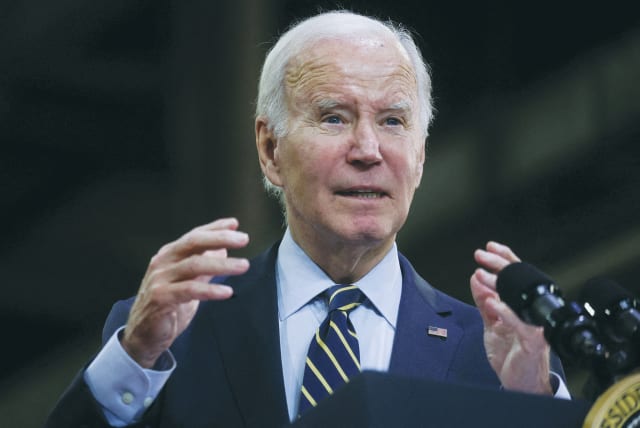For Biden, being the leader of the free world is more relevant than ever - opinion

And Biden is sticking to the strategy that has guided him since the beginning of the war – to allow the State of Israel to act against Hamas within the limits of international law.
The war on Hamas, a year and a half after Russia’s brutal invasion of Ukraine, and the intensification of the competition between the superpowers, sharpens the understanding among the leadership in the West that the international arena is once again divided between the liberal, democratic world, and the authoritarian, populist world. The divide is patent with the United States, European Union, and United Kingdom demonstrating clear support for Israel’s struggle, while Hamas enjoys the support and sympathy of Iran, China and Russia.
At home, a year out from elections, and with the backing of most of the traditional Democratic establishment, from Hillary Clinton to progressive Pennsylvania Senator John Fetterman, US President Joe Biden continues to back the Israeli military operation in Gaza. While this is not easy, especially with protests on campuses and on the left of his party, it is the right thing to do.
And Biden is sticking to the strategy that has guided him since the beginning of the war – to allow the State of Israel to act against Hamas within the limits of international law.
The US continues to leverage its influence to demand the provision of urgent humanitarian aid while calling for temporary truces to enable treatment of the wounded, the supply of food, water, and medication to the residents of Gaza, and hopefully the release of hostages. Biden understands the threat of Hamas, but also recognizes that Israel deploying military force with US backing also serves the purpose of deterring Iran and its proxies – Hezbollah and the Houthis in Yemen – vital to preventing the escalation and spreading of the war into other fronts.
However, Biden’s advisers will be constantly dealing with one big question throughout this conflict, “What will happen on the day after?”
Among the advisers, there will be those who will tell the president to escape as quickly as possible from our hopeless region. Let Israel deal alone with the reality that it helped grow out of control.
“Let the Israelis do what they want,” those advisers will tell him. “They refused to listen to the voice of reason anyway, that’s why they weakened the Palestinian Authority, that’s why they maintained the occupation and extended the settlement project, that’s why they underestimated the Hamas threat for years, that’s why they didn’t work for a political agreement, thinking that their sophisticated army will solve any challenge.”
ON THE other hand, there will be other advisers, those who understand that a superpower who claims to lead the free world does not run away from a difficult reality, but works to shape it wisely and strategically. They will remind US President Joe Biden of what happened in Afghanistan the moment he decided to “escape.” They will remind him that “he who runs away from the Middle East, the Middle East chases him.”
The latter must prevail.
Iran would be empowered should the US leave
The US leaving the region will empower Iran and its proxies, Hamas and Hezbollah. Russia and China will fill the void. The march of Islamist terrorist organizations and the axis of anti-liberal tyrannies will not stop at the borders of Gaza.
It is true that for years the Israeli-Palestinian conflict has seemed intractable, due to bad leadership on both sides, but the last few months are proof that the Palestinian issue cannot be ignored any longer; that the time has come to move to a true normalization process, which includes the Palestinian issue as part of the regional architecture in order to strengthen the pro-Western axis of the Sunni countries, and weaken the influence of Russia and China.
Similar to the aftermath of the Yom Kippur War (1973), the Israeli trauma of the October 7 massacre and the trauma created in Gaza as a result of the Israeli response, provides an opportunity to bring Israelis and Palestinians to understand that the extremists in their midst must not be allowed to prevent them from reaching a settlement to the conflict.
This is not only the last chance for the Israelis and the Palestinians, this is also the administration’s last chance to restore American influence on the Sunni oil and gas producers, as well as to influence Europe’s ability to meet the sanctions on Russia and the energy prices that affect inflation over there, as well at home.
In addition to the vital economic argument, strong leadership in the Middle East can also help Biden in an election year. It is important to maintain the support of the conservative “never Trump”-ers who support Israel and want further normalization in the Middle East, as well as the support of the moderate progressives in the Democratic Party, who want to see an initiative towards the establishment of a Palestinian state that will save Israel from a binational catastrophe.
Whether for political expediency or geopolitical power projection, the leader of the free world has never been more relevant.
The writer is J Street’s Israel executive director and a former Israeli diplomat in the US.
Jerusalem Post Store
`; document.getElementById("linkPremium").innerHTML = cont; var divWithLink = document.getElementById("premium-link"); if (divWithLink !== null && divWithLink !== 'undefined') { divWithLink.style.border = "solid 1px #cb0f3e"; divWithLink.style.textAlign = "center"; divWithLink.style.marginBottom = "15px"; divWithLink.style.marginTop = "15px"; divWithLink.style.width = "100%"; divWithLink.style.backgroundColor = "#122952"; divWithLink.style.color = "#ffffff"; divWithLink.style.lineHeight = "1.5"; } } (function (v, i) { });

